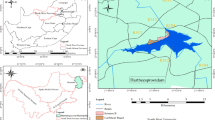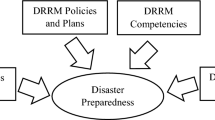Abstract
The number of global disasters per year is projected to increase 40% by 2030. In part, this increase can be tied to climate change which is exasperating existing hazards and contributing to new hazards. The specific type of hazard response that communities employ varies, dependent on demographics such as location, socioeconomic statis, governance quality, risk perception, and infrastructure, leading to a need to understand how specific communities, with their unique characteristics, respond to hazards. The main objective of this paper was to highlight hazards of concern to small coastal communities, and to determine what actions can be taken to alleviate concern. This study incorporates a hazard survey conducted across 20 coastal communities in Nova Scotia, Canada. For each community, municipal documents (bylaws/policies/plans) were compared with the lived experience of community representatives. Overall, four key insights were observed: (1) There was a general tendency that the more experience a community has had with a given hazard, the greater the concern, and the more likely the municipality was to have developed corresponding plans, policies or bylaws; (2) there were exceptions to the links between experience with hazards, concerns about them, and governmental response; (3) significant uncertainties and gaps in awareness need to be addressed in order for hazards to be dealt with effectively at community and municipal levels; (4) while municipalities engage in a certain level of responses to some specific hazards, there is a clear tendency to adopt a multi-hazard approach.





Similar content being viewed by others
References
Beaury EM, Fusco EJ, Jackson MR, Laginhas BB, Morelli TL, Allen JM, Pasquarella VJ, Bradley BA (2020) Incorporating climate change into invasive species management: insights from managers. Biol Invas 22:233–252
Birchall SJ, MacDonald S, Baran NN (2022) An assessment of systems, agents, and institutions in building community resilience to climate change: a case study of Charlottetown. Canada Urban Climate 41:101062
Bulkeley H (2010) Cities and the governing of climate change. Annu Rev Environ Resour 35:229–253
Camare HM, Lane DE (2015) Adaptation analysis for environmental change in coastal communities. Socioecon Plann Sci 51:34–45
Census Canada (2022) Dictionary, Census of Population, 2021 Population centre (POPCTR). Accessed October 2, 2023, from: https://www12.statcan.gc.ca/census-recensement/2021/ref/dict/az/definition-eng.cfm?ID=geo049a
Colchester. (2002). Central Colchester land use bylaw 2002 Municipality of the County of Colchester, Nova Scotia, Canada. Accessed April 11, 2022, from: https://colchester.ca/3494-central-colchester-land-use-bylaw-chapter-40/file
Croft PJ (2019) Environmental hazards: a coverage response approach. Future Internet 11(3):72
Cumberland (2020) Plan cumberland: land use bylaw. Municipality of Cumberland, Nova Scotia, Canada. Accessed April 11, 2022, from: https://static1.squarespace.com/static/5845c0c6f5e231a284532a4a/t/5fdb84884d91ca317ea1a66b/1608221837363/Cumberland+LUB+-+FINAL+-+2020.09.16.pdf
Cutter SL (2012) Hazards vulnerability and environmental justice. Routledge, London
Digby (2022) Digby regional emergency management. Municipality of Digby, Nova Scotia, Canada. Accessed April 11, 2022, from: https://digbymun.ca/digby-regional-emergency-management.html
Dilling L, Pizzi E, Berggren J, Ravikumar A, Andersson K (2017) Drivers of adaptation: responses to weather-and climate-related hazards in 60 local governments in the Intermountain Western US. Environ Plan A: Econ Space 49(11):2628–2648
Drakes O, Tate E (2022) Social vulnerability in a multi-hazard context: a systematic review. Environ Res Lett 17(3):033001
Esmaeili M, Barbato M (2021) Predictive model for hurricane wind hazard under changing climate conditions. Nat Hazard Rev 22(3):04021011
Fischer AP (2018) Pathways of adaptation to external stressors in coastal natural-resource-dependent communities: Implications for climate change. World Dev 108:235–248
Fitton JM, Addo KA, Jayson-Quashigah PN, Nagy GJ, Gutiérrez O, Panario D, Stempel P (2021) Challenges to climate change adaptation in coastal small towns: examples from Ghana, Uruguay, Finland, Denmark, and Alaska. Ocean Coast Manag 212:105787
GAR (2022) UN global assessment report on disaster risk reduction (GAR). United Nations. Accessed October 2, 2023, from: https://www.undrr.org/gar/gar2022-our-world-risk-gar
Government of British Columbia. (2023) Local government bylaws. Accessed October 2, 2023, from: https://www2.gov.bc.ca/gov/content/governments/local-governments/governance-powers/bylaws
Government of Canada (2021) The relationship between policies, plans and procedures. Accessed October 2, 2023, from: https://www.canada.ca/en/heritage-information-network/services/digital-preservation/concepts-developing-policies/procedure.html
Greenan BJ, Shackell NL, Ferguson K, Greyson P, Cogswell A, Brickman D, Saba VS (2019) Climate change vulnerability of American lobster fishing communities in Atlantic Canada. Front Mar Sci 6:579
Greenhill L, Kenter JO, Dannevig H (2020) Adaptation to climate change–related ocean acidification: an adaptive governance approach. Ocean Coast Manag 191:105176
West Haunts (2021) Land use bylaw. Municipality of the District of West Haunts, Nova Scotia, Canada. Accessed April 11, 2022, from: https://www.westhants.ca/bylaws/west-hants-bylaws/3471-wh-land-use-bylaw-consolidated-november-18-2021/file.html
Howarth LM, Coughlin M, Reid GK (2021) Assessing climate change vulnerability of seafood industry-dependent communities in Nova Scotia: Informing adaptation. Centre for Marine Applied Research, Dartmouth, Nova Scotia, Canada. Accessed April 14, 2022, from: https://cmar.ca/wp-content/uploads/sites/15/2021/06/2021-Howarth-et-al-Assessing-Climate-Change-Vulnerability-of-Seafood-Industry-Dependent-Communities-in-Nova-Scotia.pdf
Hsiao SC, Chiang WS, Jang JH, Wu HL, Lu WS, Chen WB, Wu YT (2021) Flood risk influenced by the compound effect of storm surge and rainfall under climate change for low-lying coastal areas. Sci Total Environ 764:144439
Kings (2020) Bylaw 106: land use bylaw. Municipality of the County of Kings, Nova Scotia, Canada. Accessed April 11, 2022, from: https://www.countyofkings.ca/upload/All_Uploads/Living/services/planning/lub/bylaw/Bylaw%20106%20-%20Land%20Use%20Bylaw.pdf
Kings (2022) Kings County Regional Emergency Management Organization. Municipality of the County of Kings, Nova Scotia, Canada. Accessed April 11, 2022, from: https://www.kingsremo.ca/
Lalancette A, Charles A (2022) Factors influencing hazard management by municipalities: the case of coastal communities. Glob Environ Chang 73:102451
Lawrence J, Sullivan F, Lash A, Ide G, Cameron C, McGlinchey L (2015) Adapting to changing climate risk by local government in New Zealand: institutional practice barriers and enablers. Local Environ 20(3):298–320
Lunenburg (2022) Local climate change action plan (2021–2030). Municipality of the District of Lunenburg, Nova Scotia, Canada. Accessed April 11, 2022, from: https://engage.modl.ca/local-climate-change-action-plan
Manuel P, Rapaport E, Keefe J, Krawchenko T (2015) Coastal climate change and aging communities in Atlantic Canada: a methodological overview of community assets and social vulnerability mapping. Can Geogr 59(4):433–446
National Risk Profile (NRP) (2023) the first public report of the national risk profile. Public Safety Canada. Accessed October 02, 2023, from: www.publicsafety.gc.ca/cnt/rsrcs/pblctns/2023-nrp-pnr/2023-npr-pnr-en.pdf
O’Gorman PA (2015) Precipitation extremes under climate change. Curr Clim Change Rep 1:49–59
Paterson B, Charles A (2019) Community-based responses to climate hazards: typology and global analysis. Clim Change 152(3–4):327–343
Porter JJ, Demeritt D, Dessai S (2015) The right stuff? Informing adaptation to climate change in British local government. Glob Environ Chang 35:411–422
R Core Team (2021) R: a language and environment for statistical computing. R Foundation for Statistical Computing, Vienna, Austria. Accessed May 24, 2022, from: https://www.R-project.org/.
Nova Scotia (1990) Emergency management act. Chapter 8 of the acts of 1990 as amended by: 2005, c. 48, ss. 1–6; 2007, c. 10, s. 2; 2009, c. 12 2011, c. 9, ss. 4–15; 2014, c. 34, s. 6. Provence of Nova Scotia, Canada. Accessed April 14, 2022, from: https://nslegislature.ca/sites/default/files/legc/statutes/emergency%20management.pdf
Nova Scotia (2019) Coastal protection act. Bill 106: Chapter 3 of the acts of 2019. Province of Nova Scotia, Canada. Accessed April 14, 2022, from: https://nslegislature.ca/legc/bills/63rd_2nd/3rd_read/b106.htm
Nova Scotia (2023) Municipality and village boundaries. Accessed October 02, 2023, from: https://data.novascotia.ca/Municipalities/Municipality-and-Village-Boundaries/7bqh-hssn
Susskind L, Kim A (2022) Building local capacity to adapt to climate change. Clim Policy 22(5):593–606
Taylor AR, MacLean DA, Neily PD, Stewart B, Quigley E, Basquill SP, Pulsifer M (2020) A review of natural disturbances to inform implementation of ecological forestry in Nova Scotia, Canada. Environ Rev 28(4):387–414
Vasseur L, Catto N (2007) Atlantic Canada. In: Lemmen DS, Warren FJ, Lacroix J, Bush E (eds) From impacts to adaptation: Canada in a changing climate. Government of Canada, Ottawa
Vogel B, Henstra D, McBean G (2020) Sub-national government efforts to activate and motivate local climate change adaptation: Nova Scotia, Canada. Environ Dev Sustain 22:1633–1653
Wachinger G, Renn O, Begg C, Kuhlicke C (2013) The risk perception paradox—implications for governance and communication of natural hazards. Risk Anal 33(6):1049–1065
Wallace B (2017) A framework for adapting to climate change risk in coastal cities. Environ Hazards 16(2):149–164
Acknowledgements
The authors would like to thank the community members who participated in this study. We are grateful to Elizabeth Dean and Rebecca Zimmerman for their large contributions to the research project on which this article is based, and to Larissa Sweeney for valuable research support.
Funding
Funding for this project was provided by the Social Sciences and Humanities Research Council, through the Ocean Canada Partnership, and from the Canadian NCE program, through the Marine Environmental Observation Prediction & Response Network (MEOPAR).
Author information
Authors and Affiliations
Corresponding author
Ethics declarations
Conflict of interest
The authors declare that they have no known competing financial interests or personal relationships that could have appeared to influence the work reported in this paper.
Additional information
Publisher's Note
Springer Nature remains neutral with regard to jurisdictional claims in published maps and institutional affiliations.
Supplementary Information
Below is the link to the electronic supplementary material.
Rights and permissions
Springer Nature or its licensor (e.g. a society or other partner) holds exclusive rights to this article under a publishing agreement with the author(s) or other rightsholder(s); author self-archiving of the accepted manuscript version of this article is solely governed by the terms of such publishing agreement and applicable law.
About this article
Cite this article
Heim, A., Charles, A. Hazard experiences, concerns and responses in coastal municipalities and communities: insights from Nova Scotia, Canada. Nat Hazards 120, 2111–2127 (2024). https://doi.org/10.1007/s11069-023-06261-x
Received:
Accepted:
Published:
Issue Date:
DOI: https://doi.org/10.1007/s11069-023-06261-x




